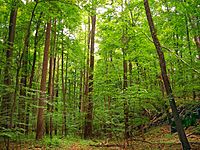
Back Bladwisselend Afrikaans Fuella caduca AN نفضي Arabic Caducifoliu AST Tatâ BCL Лістападныя расліны Byelorussian Листопадно растение Bulgarian পর্ণমোচী Bengali/Bangla Listopadne biljke BS Caducifoli Catalan
In the fields of horticulture and botany, the term deciduous (/dɪˈsɪdʒu.əs/)[1][2] means "falling off at maturity"[3] and "tending to fall off",[4] in reference to trees and shrubs that seasonally shed leaves, usually in the autumn; to the shedding of petals, after flowering; and to the shedding of ripe fruit. The antonym of deciduous in the botanical sense is evergreen.
Generally, the term "deciduous" means "the dropping of a part that is no longer needed or useful" and the "falling away after its purpose is finished". In plants, it is the result of natural processes. "Deciduous" has a similar meaning when referring to animal parts, such as deciduous antlers in deer,[5] deciduous teeth (baby teeth) in some mammals (including humans); or decidua, the uterine lining that sheds off after birth.
- ^ "deciduous". Dictionary.com Unabridged (Online). n.d.
- ^ "deciduous (adjective)". Oxford Advanced Learner's Dictionary – via OxfordLearnersDictionaries.com.
- ^ Whitney, William Dwight. The Century Dictionary and Cyclopedia. p. 1484.
- ^ Housel, Debra J. (2009). Ecosystems. Capstone Publishers. ISBN 9780756540685.
- ^ Gause, John Taylor (1955). The Complete Word Hunter. A Crowell reference book. New York: Crowell. p. 465.



